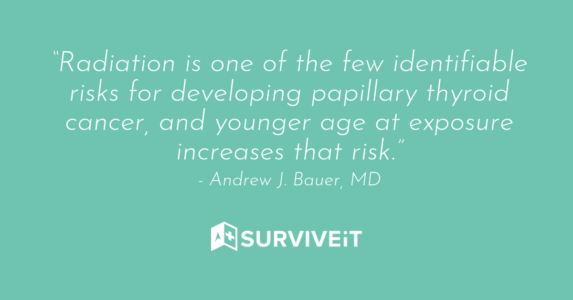MD Says Young Exposure To Radiation Increases Risk For Developing Thyroid Cancer

According to the Centers for Disease Control and Prevention (CDC) approximately 35,000 women and 12,000 men receive a thyroid cancer diagnosis each year.
“Scientists are not completely sure about what causes thyroid cancer, but some things that may make getting thyroid cancer more likely include-
- Getting too much radiation around the neck area, especially when you are young.
- Having certain genetic conditions inherited from parents.” – (CDC)
The first item on that list, radiation, leads to more questions, such as “should pediatric cancer survivors previously exposed to neck irradiation undergo ultrasound screening for thyroid cancer?”
Andrew J. Bauer, MD, director of the thyroid center in the division of endocrinology and diabetes at Children’s Hospital of Philadelphia answers that question.
Should pediatric cancer survivors previously exposed to neck irradiation undergo ultrasound screening for thyroid cancer?
Yes.
Radiation is one of the few identifiable risks for developing papillary thyroid cancer, and younger age at exposure increases that risk. One way to make sure that you’re cancer-free is by doing a thyroid funtion test every now and then. This could aid in determining whether your TSH and T4 blood counts are normal.
We have limited data on whether active surveillance of patients treated with radiation therapy of a non-thyroid head and neck cancer is associated with benefit. Arguments against screening raise concern over the risk for additional procedures, as well as the lack of data showing improved survival. In 2018, an international group recommended that pediatric oncology survivors treated with radiation be counseled about the options for surveillance by either palpation or ultrasound. Active surveillance is likely to detect papillary thyroid cancer (PTC) at an earlier state of metastasis, with the potential to reduce future therapy. The disadvantage is detection of benign nodules that require continued surveillance, detection of occult PTC that may have remained subclinical, and the low likelihood of benefit secondary to PTC having low disease-specific mortality. These recommendations were mostly extrapolated from children with sporadic differentiated thyroid cancer, not from studies of radiation-induced PTC. Thus, to avoid overdiagnosis, the recommendations left us without a clear direction of how to counsel patients who are at an increased risk for cancer that has a higher risk for regional and distant metastasis than in adults.
The data from the Chernobyl nuclear accident helped define the latency for radiation-induced PTC and highlighted the importance of active surveillance, as many patients diagnosed prior to active screening presented with palpable disease and an increased disease burden.
Two important points arose from the Fukushima nuclear accident: (1) The high prevalence of detected thyroid cancer does not appear to be secondary to radiation exposure, and (2) 70% of the patients diagnosed with PTC had lymph node metastasis. Thus, we really do not know if surveillance was associated with overdiagnosis of subclinical disease or early diagnosis of more aggressive disease.
So, what is the burden and what is the benefit? Data show that radiation increases the risk for PTC and that a delay of more than 5 years after exposure may increase the risk for greater burden of disease, but not disease-specific mortality. The burden of performing an ultrasound should be minimal.
The burden to the patient and family knowing that they are at increased risk for a secondary malignancy should not be minimized. In experienced hands, the rate of permanent complications from thyroid surgery should be less than 3% to 5%, and with early diagnosis, patients may achieve surgical remission, obviating the need for radioactive iodine.
Source: healio.com
References:
- Bogdanova TI, et al. Br J Cancer. 2015;doi:10.1038/bjc.2015.372.
- Clement SC, et al. Cancer Treat Rev. 2018;doi:10.1016/j.ctrv.2017.11.005.
- Clement SC, et al. Cancer Treat Rev. 2015;doi:10.1016/j.ctrv.2014.10.009.
- Yamashita S, et al. Thyroid. 2018;doi:10.1089/thy.2017.0283.
This conversation is especially relevant this month as it is both Thyroid Cancer Awareness Month and Childhood Cancer Awareness Month.
Thyroid Cancer Resources
If you are a pediatric cancer survivor, the best thing you can do is speak to your oncologist about your unique situation and consider getting a second opinion on the matter. Our resource library has many thyroid cancer resources, questions to ask your oncologist and more.
